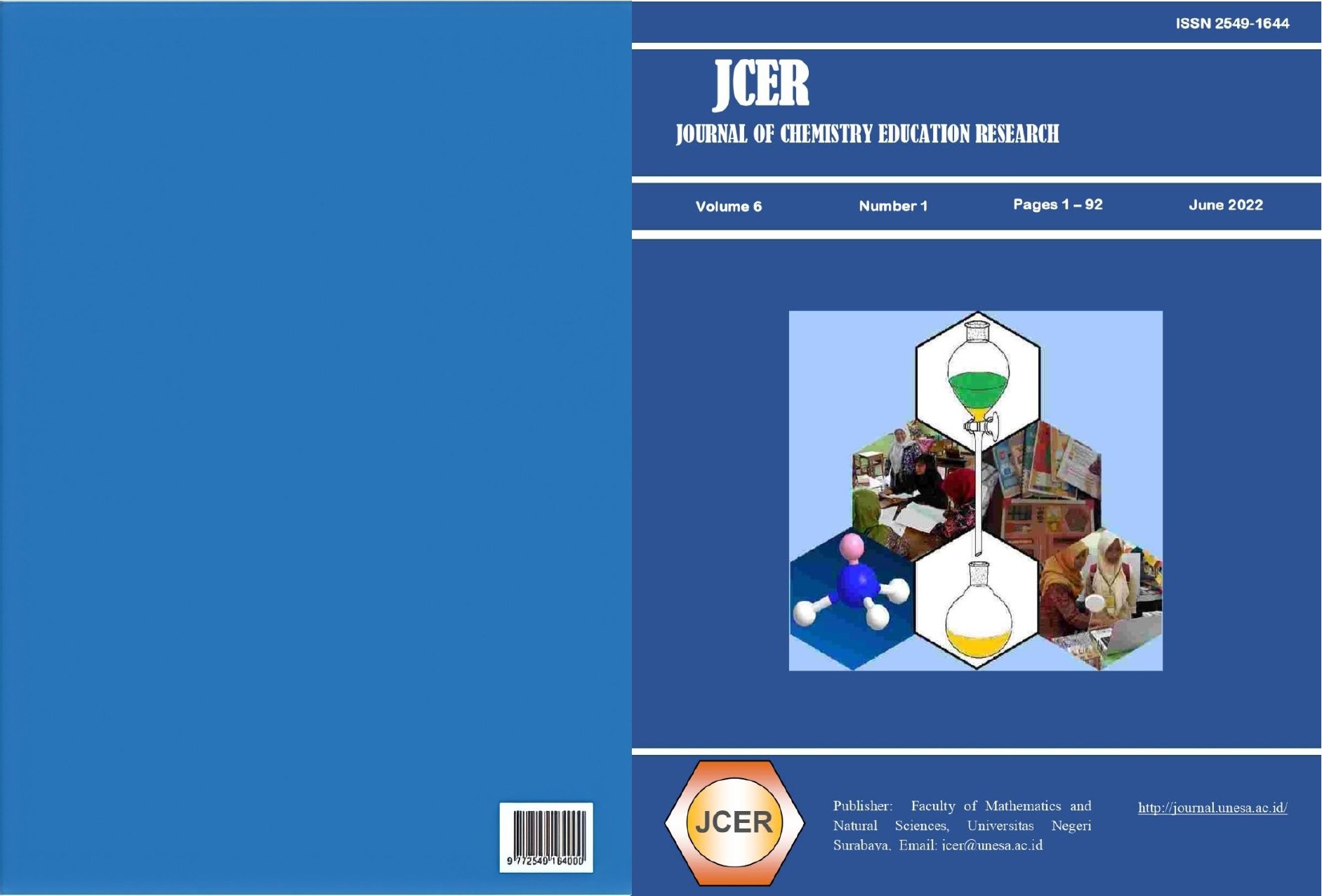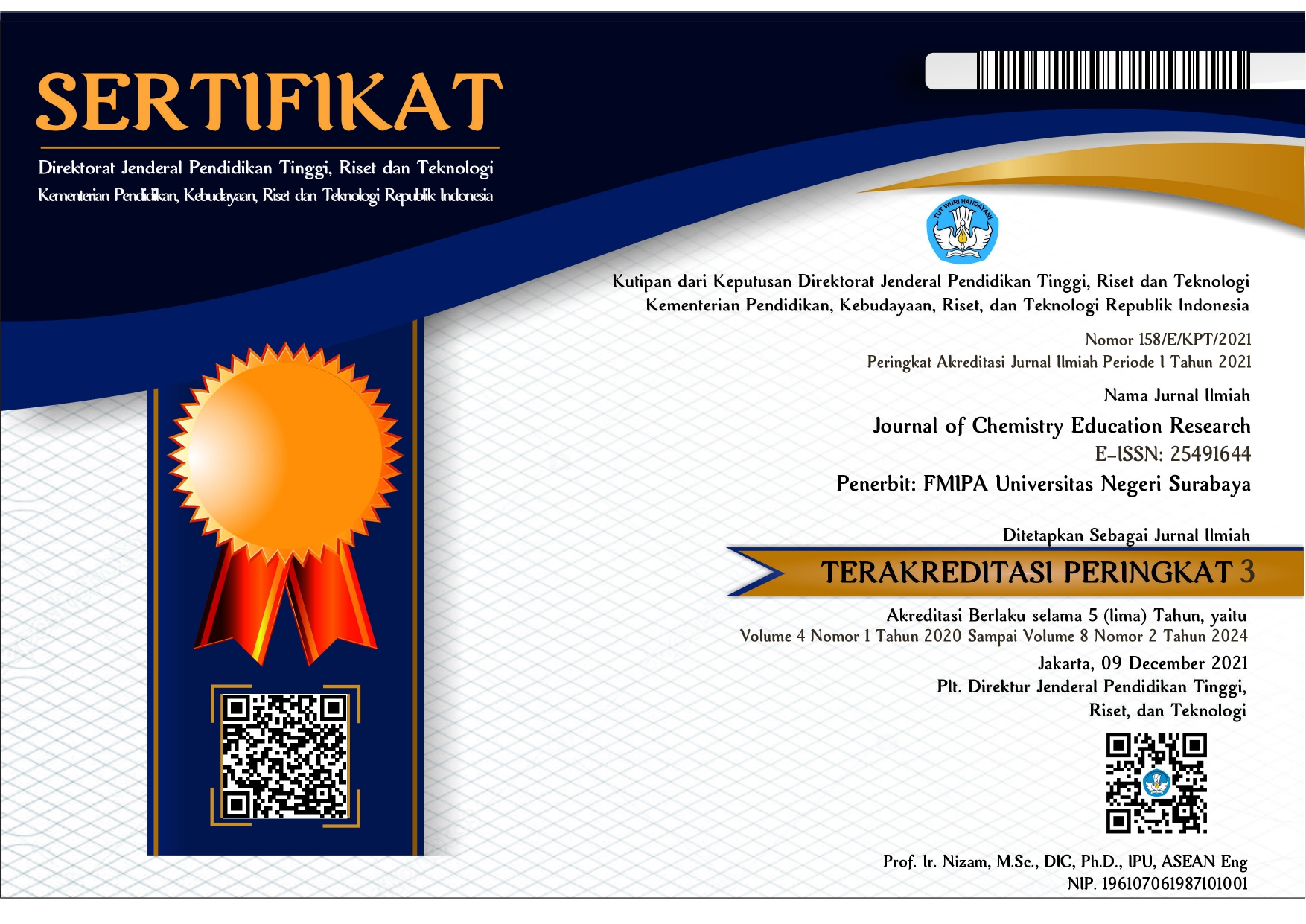STEM INTEGRATED CHEMISTRY LEARNING EFFECTIVENESS (SCIENCE, TECHNOLOGY, ENGINEERING, AND MATHEMATICS) IN THE TIME OF COVID-19
DOI:
https://doi.org/10.26740/jcer.v6n1.p72-76Keywords:
Effectiveness, STEM, Chemistry, Molecular geometryAbstract
Abstract. The purpose of this study was to determine the effectiveness of STEM (Science, Technology, Engineering, and Mathematics) integrated learning on the material of molecular form for Class X MA Al-Khoiriyah students. The research design used in this research is descriptive analysis. The stages of this research consist of 3 (three) stages, namely pre-research, testing the validation of research tools, and implementing STEM integrated learning. As for knowing the effectiveness is measured by indicators, namely the level of student learning completeness after integrated STEM learning activities and the resulting STEM products. From the analysis of the final test, it can be seen that of the ten students who were the research subjects, 80% had achieved completeness and the resulting STEM product was in the good category so it can be concluded that STEM integrated learning is effectively used in molecular geometry learning.
Keywords: Effectiveness, STEM, Chemistry, Molecular geometry
References
Ubaidah, A., Fatayah, F., Susilowati, Y., Merdekawaty, A., Rahmaniah, R., & Syaharuddin, S. 2021. Differences in Perceptions Between Parents and Teachers on Online Learning During the Covid-19 Pandemic. IJECA (Internasional Journal of Education and Curriculum Application), Vol. 4, No. 1, pp. 11-17.
Mezia, A., Cawang, & Kurniawan, A.D. 2018. Identifikasi Kesulitan Belajar Siswa pada Materi Ikatan Kimia Siswa Kelas XB SMA Negeri Siantan Kabupaten Mempawah. Ar-Razi Jurnal Ilmiah, Vol. 6, No. 2, pp. 35-40.
Fauziyah, N. 2016. Identifikasi Letak Kesulitan dan Faktor-Faktor yang Mempengaruhi Kesulitan Belajar Siswa Kelas X IPA SMA Negeri 4 Malang pada Materi Ikatan Kimia. Malang: Jurusan Kimia FMIPA Universitas Negeri Malang.
Irwansyah, R., Darmayani, S., Mastikawati, M., Saputro, A.N.C., Wihartanti, L.V., Fauzi, A., Arifudin, O., Purandini, I.P.Y., Latifah, E.D., Septiyani, T., Pangestika, R.R., Fatayah, F., Ayuningtyas, P., Lemba, V.C., & Hartono, R. 2021. Perkembangan Peserta Didik. Bandung: Widina.
Permanasari, A. 2016. STEM Education: Inovasi dalam Pembelajaran Sains. Prosiding SNPS (Seminar Nasional Pendidikan Sains).
Mulyani, Tri. 2019. Pendekatan Pembelajaran STEM untuk Menghadapi Revolusi Industry 4.0. Prosiding Seminar Nasional Pascasarjana.
Rahmadhani, E., Wahyuni, S., &Mandasari, L. 2021. Kemampuan Pemahaman Konsep pada Pembelajaran Matematika Berorientasi React dan STEM. Aksioma Jurnal, Vol. 10, No. 2, pp. 615-629.
Downloads
Published
Issue
Section
License

This work is licensed under a Creative Commons Attribution-NonCommercial 4.0 International License.
 Abstract views: 553
,
Abstract views: 553
, PDF Downloads: 512
PDF Downloads: 512



